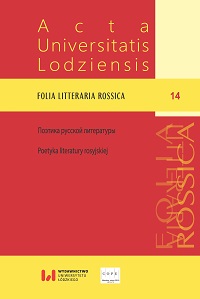“Parad Idiotov” by Gehrikh Sapgir in the Context of Twentieth-Century Poetry
DOI:
https://doi.org/10.18778/1427-9681.14.17Keywords:
twentieth-century poetry, motif, continuity, transformation, dialogue, Soviet poetry, Genrikh SapgirAbstract
This paper analyses and interprets possible sources of the subtext in Genrikh Sapgir’s poem “Parad idiotov” [‘A Parade of idiots’], namely motifs of the road and marching onward, as reflected in the revolutionary parades of the early twentieth century and in the Soviet poetry for children and for the general reader. In the poetry of Aleksandr Galich and Iosif Brodsky the revolutionary fervour of the parade is presented ironically. In it, the distinctions between military and civil parades, between the jubilee parade and a workers’ demonstration are elided: movement to the music itself becomes a characteristic motif of the poetry of the 1960s, so that the motif of the parade becomes not just a literary signifier, but also a feature of everyday life, suggesting on the one hand joy and celebration, and on the other the greatness of the country and the glorification of the Soviet man who strides along “the correct path”. In parallel with the semantics of a holiday, the motif of the procession acquires an additional meaning (also inspired by the era) of a forced movement, the march of prisoners towards their place of imprisonment. Sometimes the parade motif takes on both meanings: the joyous march and the listless marching of puppets become woven into a single whole. It is noteworthy that in children’s poetry, the parade motif is indistinguishable from its counterpart in “adult” poetry. The lyrical subject of Sapgir’s poem, who walks towards the parade of idiots, merges with it: movement is proclaimed to be the goal of life, and death for a dream with a blissful smile – the romantic idea of an idiot. It is probably no coincidence that Sapgir’s text contains no direct quotes from previous “parade” texts nor clear markers of a genetic connections with them: the poet is quoting not texts, but the epoch.
Downloads
References
Barto, Agniya L. Stikhi Agnii Barto https://barto.su/
Google Scholar
Brodskii, Iosif A. Sochineniya Iosifa Brodskogo: v 7 t., ed. Ya. A. Gordina. Sankt-Peterburg: Pushkinskii fond, 2001.
Google Scholar
Fomenko, Igor V. «Nado chto-to srednee, da gde zh ego vzyat...». In: Sotsiokulturnyi fenomen shestidesyatykh: sbornik nauchnykh statei. Moskva: Rossiyskii gosudarstvennyi gumanitarnyi universitet, 2008: 28–33.
Google Scholar
Galich, Aleksandr A. Sochineniya: v 2 t., vol. 1, ed. A. Petrakova. Moskva: Lokid, 1999.
Google Scholar
Kuricyn, Vyacheslav N. “Postmodernizm: novaya pervobytnaya kultura”. Novyi mir. No. 2 (1992): 225–232.
Google Scholar
Mayakovskii, Vladimir V. Polnoe sobranie sochinenii: v 13 t. Moskva: Gosudarstvennoe izdatelstvo khudozhestvennoi literatury, 1955–1961.
Google Scholar
Orlitskii, Yurii B. Vvedenie v poetiku Sapgira: sistema protivopostavlenii i strategiya ikh preodoleniya. In: Velikii Genrikh. Sapgir o Sapgire, ed. T. Mikhaylovskaya. Moskva: Rossiyskii gosudarstvennyi gumanitarnyi universitet, 2003: 159–167.
Google Scholar
Sapgir, Genrikh V. Stikhotvoreniya i poemy, ed. D. P. Shraer-Petrov and M. D. Shraera. Sankt-Peterburg: Akademicheskii proekt, 2004.
Google Scholar
Sovetskaya poeziya: v 2 t. Moskva: Khudozhestvennaya literatura, 1977.
Google Scholar












